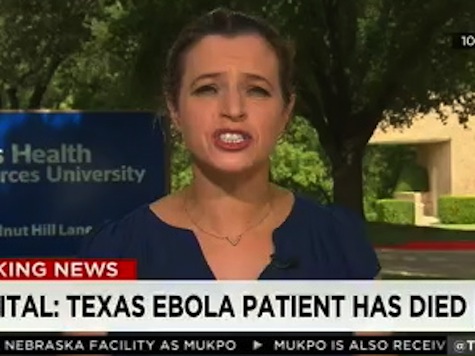Wednesday on CNN after reporting the death of Thomas Eric Duncan, CNN senior medical correspondent Elizabeth Cohen said there were many “questions” about the medical treatment the first patient who developed Ebola in the United States received.
Cohen said, “I think the family will have a lot of questions for this hospital. They want to know why he was sent home when he arrived with a fever and having said that he had been in Liberia. They will want to know why it took nearly a week to get him an experimental medication whereas other patients who have Ebola got those medications immediately. They’ll want to know why he didn’t get blood products from someone with Ebola, other patients have gotten blood products from people with Ebola. they will have all of those questions for this hospital.
She continued, “He [Duncan] got this anti-viral drug called Brincidofovir, it’s an experimental medication, ten days after getting sick. That’s a long time for Ebola, which is a quick-moving virus. It is really not clear why it took quite that long. We know it took several days from the beginning because the hospital didn’t think he had Ebola andhe sent him home even though they were told he’d been in Liberia and had a fever. It took nearly a week to get him Brincidofovir whereas other patients got a drug or another experimental Ebola drug immediately. So, you know, it’s never — there’s definitely some questions here.”
“it is unclear to me why that blood went to the patient in Nebraska yet Duncan, according to his family, never got a blood transfusion. I’ve reached out to the hospital many times and said “Is he getting a transfusion if not, why isn’t he?” and hay haven’t responded to my e-mails. His family said they were told a blood transfusion wasn’t proven to be effective so he wasn’t going to get one. The problem with Ebola is that nothing is proven to be effective except for basic supportive care like getting someone fluids. But as far as these treatments, Zmapp, Brincidofovir, blood products, none of this is proven to be effective. We’re in the middle of a crisis here. There’s no time to do those studies. right now doctors are just trying whatever sort of makes sense,” she added.
Follow Pam Key on Twitter @pamkeyNEN

COMMENTS
Please let us know if you're having issues with commenting.